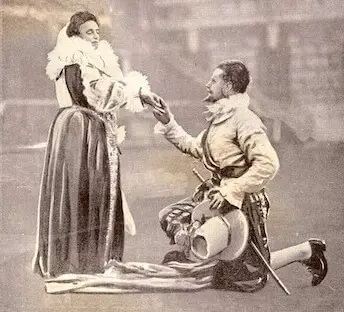‘Without so much as a by your leave’ is an old phrase but is still often used when someone, who might have been expected to have asked permission first, is disapproved of for acting on their own authority. The expression began life in the early 19th century. The first mention that I can find of a version in print is from The New-England Magazine Volume 3, September 1832:
The evil creature [a mosquito] … lit upon my forehead. Already he had inserted his atrocious tube, and was drawing blood, without so much as the civility of By your leave.
An example of the precise current version came a few years later, in Blackwood’s Edinburgh Magazine, Volume 51, 1842:
“You [an itinerant peasant] have taken a place by our fire, without so much as a ‘by your leave'”.
This expression is an unusual example of a phrase made from two separate phrases. The form ‘without so much as…’ has been used since the 16th century to indicate that someone had failed to do something that they had been expected to do; for example, this piece from The Countesse of Pembrokes Arcadia, by Sir Philip Sidney, 1590:
Lifting his feete aboue his head, making a great deale of salt water to come out of his mouth, they layd him vpon some of their garments… At length, opening his eyes, he gaue a great groane… Hee (without so much as thanking them for their paines) gate vp. [got up]
Before we can decipher what ‘without so much as a by your leave’ means, we also need to understand ‘by your leave’. I have to admit that, as a callow youth and when my mother used this phrase, I thought it was ‘without a by or leave’, not really knowing what a ‘by’ or a ‘leave’ might be.
Perhaps I should have been quicker on the uptake, as ‘by your leave’ was commonly heard in 1950s swashbuckling ‘tights and knights’ B-feature movies, just as ‘shiver me timbers‘ was drawled by yo-ho-ho screen pirates. Nevertheless, unlike that nautical expression, which was probably the invention of a landlubber author, ‘by your leave’ is an authentic medieval colloquial phrase. It derives simply from the medieval meaning of ‘leave’, that is, ‘permission’.
To ‘ask leave’ of someone wasn’t to request to depart their presence but to ask permission of them to do something and, as it would only be asked of someone who had the power to grant or bar such permission, it was often expressed as ‘by your leave, sire’. That may be the association that has caused another misstated version of it, as ‘by your liege’.
‘Leave’ has been used with the meaning of permission since at least the 9th century. It was still commonplace in Shakespeare’s day and he used it numerous times in his plays, for example, in The Merchant of Venice, 1596:
Shylock: I pray you give me leave to go from hence.
Very soon after that comes the first example of ‘by your leave’ that I can find in print, in Henry Buttes’ Dyets drie dinner, 1599:
(by thy leaue) Ile be a Guest of thine.

